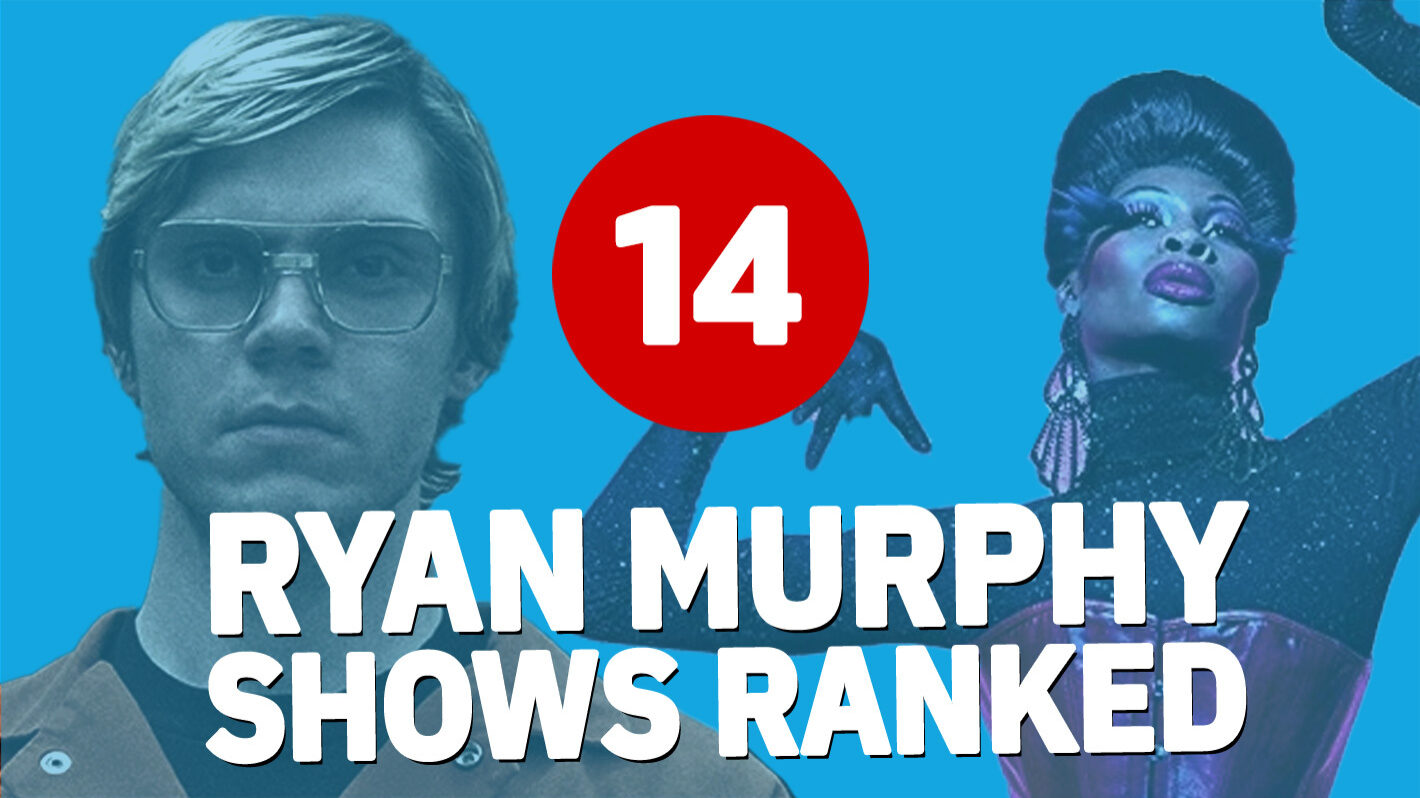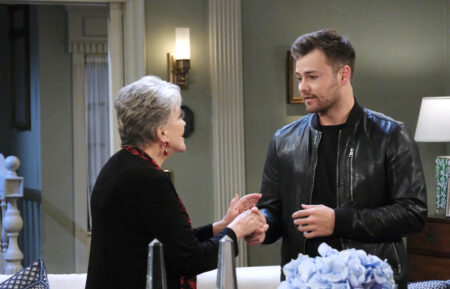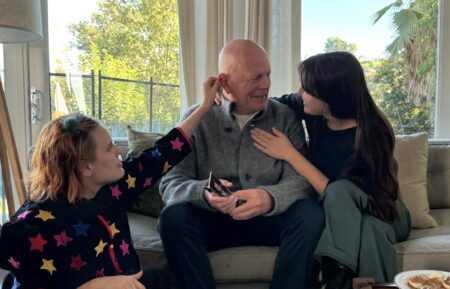‘Dahmer’ EP Ryan Murphy on the Netflix Series’ Popularity: ‘People Are Looking to Find a Place to Put Their Anxiety’
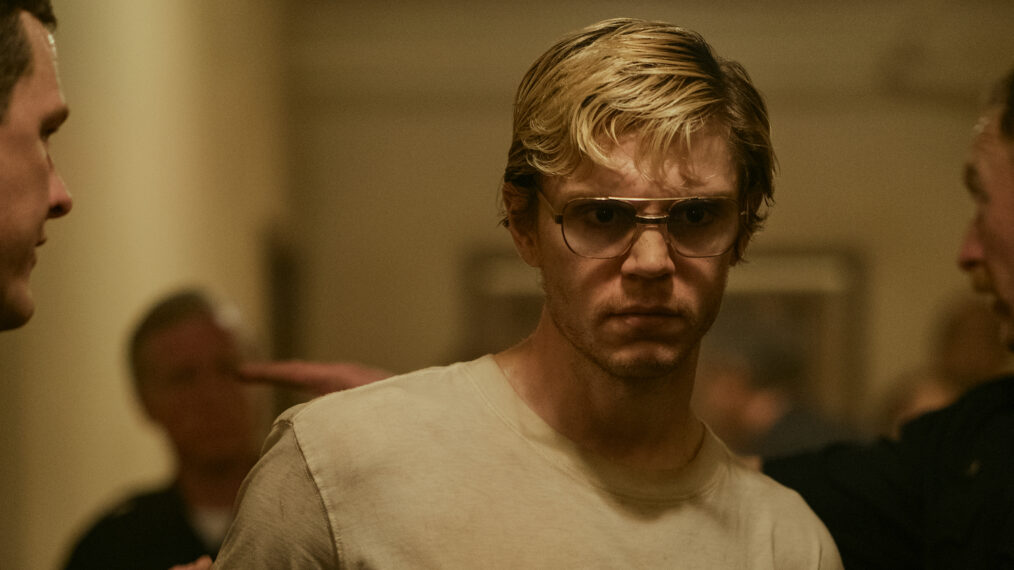
The intense real-life subject matter of Dahmer — Monster: The Jeffrey Dahmer Story hasn’t detracted folks from tuning into the show. Netflix’s 10-episode drama has accumulated over 500 million hours in views and has been seen in at least 56 million homes since it debuted in September. However, at least once cast member, Richard Jenkins (Six Feet Under, Step Brothers), who plays serial killer Jeffrey Dahmer’s father, Lionel Dahmer, had reservations about joining the series.
Ryan Murphy (9-1-1, American Horror Story), who is the executive producer, creator, and writer, reached out to Jenkins because he’d penned the role of Lionel for him. The actor’s initial response was guarded at best.
“I said, ‘Ugh,’” Jenkins shared with a group of reporters and other invited guests at a recent Q&A held at the Netflix offices in Hollywood. “[Ryan] said, ‘Read it.’ I did, and it immediately interested me. The last thing I thought was a Jeffrey Dahmer movie would be so ‘human,’ but that is exactly what [Ryan and Ian Brennan] wrote.”
Murphy said he spent years researching the series, which does more than explore the mind of a deranged killer. “We weren’t interested in ‘Jeffrey Dahmer, the monster,’” Murphy explained, but rather, “What made him the monster? Who was complicit in making the monster? We tried to tackle systemic racism, homophobia, and we were always thinking of the victims.”
Murphy cast Niecy Nash-Betts (The Rookie: Feds) as Glenda Jackson, a neighbor of Dahmer’s who passed away in 2011. She knew there was something off about Dahmer, to say the least, but she could not get anyone — especially the authorities — to listen to her. Despite her pleas that something was seriously wrong, the police returned one of Dahmer’s victims, Konerak Sinthasomphone, who was only 14 years old, to him after mistakenly believing that they were in a consensual relationship. Later, Dahmer killed Sinthasomphone.
“I felt a responsibility to get it right,” Nash-Betts said. “[Glenda] was the town crier, the ‘nosy neighbor,’ who asked, ‘Are you not seeing what I’m seeing?’ The police came and walked that baby back into the apartment…I kept saying, ‘This really happened. But because a black woman was doing the complaining and because there was a homosexual relationship…this baby was walked back into the house and met his demise and he didn’t have to.’”
Choosing the right actor to play Dahmer was critical, and when the casting department wasn’t finding him, Murphy put in a call to Evan Peters (WandaVision), whom he had hired to appear in the first season of America Horror Story. “I joke that I cast him because he looked like Jessica Lange and he played her son,” Murphy recalled. “But on his first day, I was, ‘Holy [expletive]! This kid can act!’ He is now being talked about in the same breath as Marlon Brando, Robert De Niro, and Leonardo DiCaprio…I could not be prouder of [him].”
“First, thanks for saying all that,” Peters said to Murphy adding, “The writing was brilliant. I was terrified. I went back and forth as to whether I should do it or not. I knew it would be incredibly dark and an incredible challenge.”
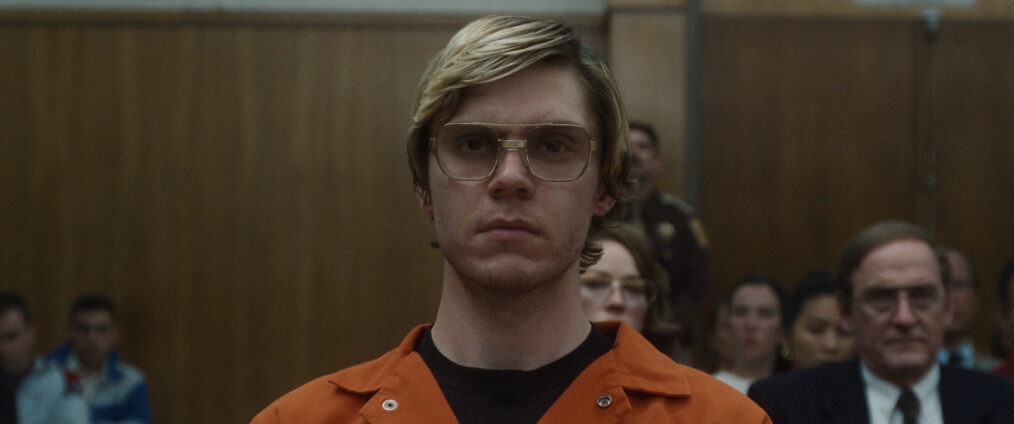
Courtesy Of Netflix
Murphy recommended to Peters that he watch the Stone Phillips/Jeffrey Dahmer interview from 1994. “You really see [Dahmer] speak about how he did what did,” Peters shared. “I was fascinated by that. I wanted to dive into the psychology of that extreme side of human behavior. I read as many books as I could [on him], trying to understand why he did what he did.”
In order to capture Dahmer’s physicality, Peters walked around with weights on his arms and kept his back extremely straight. “He didn’t move his arms [much],” Peters offered. He wore lifts in his shoes and eyeglasses worn by Dahmer. “I wanted things to be second nature when we were shooting. I watched a lot of footage and worked with a dialogue coach.”
Evans also stayed in character throughout filming — so much so that Nash-Betts said she felt as if she did not get to even meet her co-star fully until after filming was completed. “Niecy walked up to Evan and said, ‘Evan Peters, nice to meet you’…even though they’d worked together for months,” Murphy recounted.
“People would ask me, ‘What’s Evan like?’ and I would say, ‘I don’t know! I don’t know the man!’” Nash recalled. Her anecdote elicited a laugh from Q&A attendees, but she was quite serious about the matter. “I’d come in and say, ‘Good morning! How you doing?’ Then, I realized he’s in his process. I wanted to respect that.”
Turning to Peters, Nash said, “I prayed for you a lot. For real. This is real weighty when you stay in it. And you’re tethered to the material like bone to marrow. I could see [Evan] getting tired. I kept him in my prayers, and he wanted to do this justice.”
Evans said that a saying Nash’s grandmother used to recite gave him strength. “My grandmother said, ‘Hang tough till you get enough. And when you get enough — still hang tough!’” Nash shared. “I appreciated that,” Evans responded. “This [role] pushed my limits and I tried to respect that.”
How did he unwind after playing a dangerous, violent sociopath for months? “I brought a lot of darkness and negativity [to the part],” Evans said. “Having the end goal in sight, knowing we’d wrap [helped]. Now, it’s time to bring joy and romance and to go back [home] and see my friends and watch Step Brothers.”
Murphy said that all the parts in Dahmer are difficult to play, including Jenkins’ role of Lionel. The father visited his son after he’d been convicted and told him that he felt responsible for what had occurred. “That day terrified me,” Jenkins said. “I didn’t know what was going to happen. I got there and I looked into [Evan’s] eyes and I told him.”
The actors took time to praise not only Murphy for the opportunity he gave them to play these real-life characters, but also each other’s performances. “Evan is brilliant in this,” Jenkins said. “I’ve worked with a lot of actors and this kid is great — as is Miss Nash. There are some brilliant performances in this.”
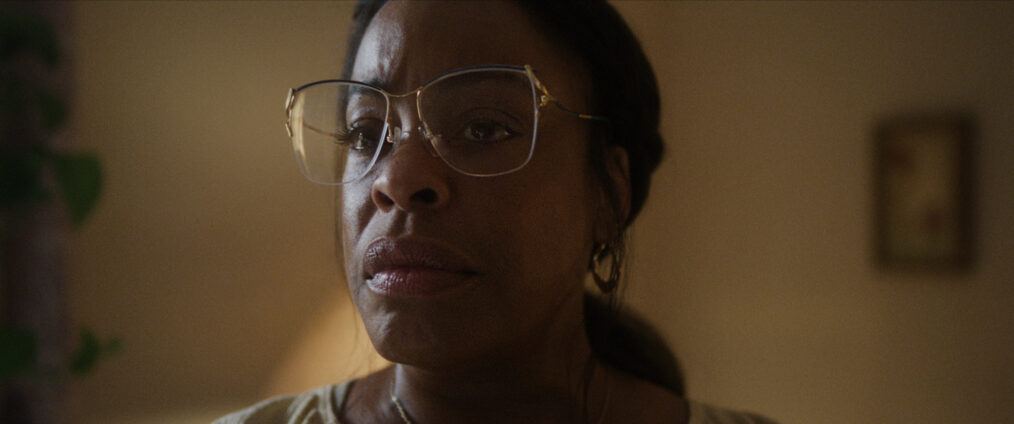
Courtesy Of Netflix
“You were wonderful,” Peters told Nash-Betts, referencing the last scene between their characters. “It was amazing to see your character stand up to [mine] and put him in his place. [Jeffrey] had no choice but to walk out.”
“There was so much unknown,” Nash said of the scene in which Glenda confronted a guilty Jeffrey. “I didn’t know how [he] was going to play it, which ultimately informed how I’d play it. It’s a dance. There’s reciprocity. I was looking forward to that [confrontation] the most, but I was scared the most, too. It was going to put a stamp on what we were doing. I tried to steel myself. Let me see what he does. Thank you, Evan. Thank you.”
Murphy said exhaustive research was spent on Dahmer in order to make the series the best it could possibly be: “You can tell everyone who made the show went into it with the utmost care.” One thing that may never be able to be answered, however, is why this series has touched so many people and resulted in so many views.
“I have two theories,” Murphy offered. “The world is so dark [now], people are looking to find a place to put their anxiety. Ever since COVID, people are concerned about mental health. Any other ideas?”
“I think they watch because of me,” quipped Jenkins, who hastened to add, “No, that’s not why. I have no idea. That’s what’s so wonderful because it’s so surprising. You embrace it, you let it go, and then, you move on. If anyone knew why it was happening, it’d be happening all the time. It’s a beautiful surprise.”
In giving Glenda Jackson a voice, Nash-Betts feels that she’s also shown that there’s far more to her talent than her ability to make people laugh. “I was told that I had a lane — it’s comedy,” she said. “‘Stay there. It’s what you know how to do.’ This project and acting alongside the likes of [Peters and Jenkins] have shown me I can hold my own in this space.”
“Hold your own?” Jenkins said in a tone that revealed he firmly believes that Nash-Betts can do far more than that.
Murphy concured. “I worked with Niecy in 1998 on Popular,” he says. “She played a talking lobster. Now, we have seen this comedic genius become this incredible dramatic actress that I always knew was there.”
Dahmer: Monster — The Jeffrey Dahmer Story, Streaming Now, Netflix

